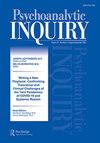作为剧作家的精神分析学家
IF 0.5
4区 心理学
Q3 PSYCHOLOGY, PSYCHOANALYSIS
引用次数: 0
摘要
摘要:Karbelnig博士扩展了先前理论家提出的精神分析与戏剧的比较,引入了精神分析结局的新概念。他将这些与亚里士多德的anagnorisis和peripeteia概念区分开来,并将它们与禅宗中的顿悟或当代词汇中的“顿悟”时刻等现象进行了比较。三个连续会议的记录(完全匿名)证明了精神分析的结果。两次会议显示出明确的精神分析结果;其中一个是一个明显的精神病患者,表现出强烈的情感表达和认知洞察力,但没有精神分析的结局。这些临床样本说明了戏剧隐喻如何结合现象学和理论视角,允许微观或宏观的精神分析遭遇研究,并证实了它们的不可模仿性。Karbelnig博士最后指出,这些与戏剧的类比有助于扩展现有的元心理学,但就像所有的心理理论一样,必然存在不足。关键词:戏剧;精神分析学家;精神分析的结局;alan Michael Karbelnig, ABPP博士,培训和监督精神分析学家,在加州帕萨迪纳提供以精神分析为导向的个人和夫妻心理治疗。他获得了法医心理学认证,还在行政和就业法领域提供心理法律服务。他在南加州大学(USC)获得咨询心理学博士学位,在新精神分析中心(NCP)获得精神分析博士学位。他创立了玫瑰城市中心(RCC),这是一家非营利性的精神分析诊所,为加利福尼亚的经济弱势群体提供服务。本文章由计算机程序翻译,如有差异,请以英文原文为准。
The Psychoanalyst as Dramatist
ABSTRACTExtending psychoanalysis-drama comparisons proffered by prior theorists, Dr. Karbelnig introduces the novel concept of the psychoanalytic denouement. He differentiates these from Aristotle’s concepts of anagnorisis and peripeteia, and he compares them to phenomenon like Satori from Zen Buddhism or the “Aha” moment from the contemporary lexicon. Transcripts from three consecutive sessions (completely anonymized) demonstrate psychoanalytic denouements. Two sessions show clear psychoanalytic denouements; one, featuring an overtly psychotic patient, reveals intense emotional expression and cognitive insight but no psychoanalytic denouement. These clinical samples illustrate how theatrical metaphors incorporate phenomenological and theoretical perspectives, allow for micro- or macroscopic studies of psychoanalytic encounters, and confirm their inimitable nature. Dr. Karbelnig concludes by noting these analogies to drama helpfully expand extant metapsychology but, like all theories of mind, necessarily fall short.KEYWORDS: Dramatheaterpsychoanalyst-as-dramatistpsychoanalytic denouementfairbairntransformation Disclosure statementNo potential conflict of interest was reported by the author.Additional informationNotes on contributorsAlan Michael KarbelnigAlan Michael Karbelnig, Ph.D., ABPP, a training and supervising psychoanalyst, provides psychoanalytically oriented individual and couples psychotherapy in Pasadena, California. Board certified in forensic psychology, he also offers psycho-legal services in the realms of administrative and employment law. He earned doctorates in Counseling Psychology from the University of Southern California (USC) and in Psychoanalysis from the New Center for Psychoanalysis (NCP). He founded Rose City Center (RCC)—a not-for-profit psychoanalytic clinic serving economically disadvantaged individuals in California.
求助全文
通过发布文献求助,成功后即可免费获取论文全文。
去求助
来源期刊

Psychoanalytic Inquiry
PSYCHOLOGY, PSYCHOANALYSIS-
CiteScore
1.00
自引率
33.30%
发文量
65
期刊介绍:
Now published five times a year, Psychoanalytic Inquiry (PI) retains distinction in the world of clinical publishing as a genuinely monographic journal. By dedicating each issue to a single topic, PI achieves a depth of coverage unique to the journal format; by virtue of the topical focus of each issue, it functions as a monograph series covering the most timely issues - theoretical, clinical, developmental , and institutional - before the field. Recent issues, focusing on Unconscious Communication, OCD, Movement and and Body Experience in Exploratory Therapy, Objct Relations, and Motivation, have found an appreciative readership among analysts, psychiatrists, clinical psychologists and a broad range of scholars in the humanities.
 求助内容:
求助内容: 应助结果提醒方式:
应助结果提醒方式:


